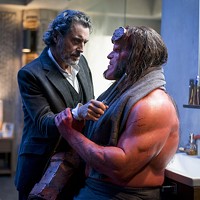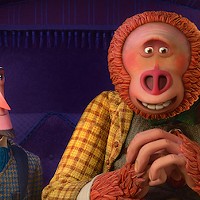

(View From The Couch is a weekly column that reviews what's new on Blu-ray and DVD.)
THE INTOUCHABLES (2012). Based on a true story, this global smash centers on the relationship between Philippe (François Cluzet), a millionaire who's been a quadriplegic ever since a paragliding accident, and his caretaker Driss (Omar Sy), an ex-con from the projects who reluctantly accepts the position even though he had planned on continuing to collect those welfare checks. Philippe is cultured, reserved, but not without a sense of humor; Driss is boisterous, crude, and willing to joke about anything. Philippe appreciates that Driss doesn't pity him — if anything, Driss goes out of his way to mock his employer's immobile condition, his love for the arts, and his taste in music (he asserts that Bach was an "18th century Barry White") — and it's not long before the men come to genuinely care for each other. There was some initial criticism regarding the decision of writer-directors Olivier Nakache and Eric Toledano to turn Driss into a black man (something he wasn't in real life), but I'm inclined to think that choice was made in order to cast the popular comedian Omar Sy in the role as opposed to adhering to a stereotypical master-servant relationship. Still, the film's examination of class differences is often heavy-handed and condescending — when Driss, who shares a tiny bathroom in his slum home with a half-dozen family members, first spots the luxurious bathroom that will be his and his alone in Philippe's house, did we really need to hear Franz Schubert's "Ave Maria" playing in the background? Some plotting issues also threaten to undermine the goodwill generated by both the film and its characters. At one point, Philippe elects to send Driss back to the projects to tend to his family, a decision that makes no sense considering Philippe's enormous wealth (he couldn't have helped the family himself?) and the dead-end options available to Driss there. (If this vignette was based on fact, the real-life Philippe suddenly becomes a lot less appealing, though of course here his decision is framed as a noble one.) Thankfully, the performances hold everything together. Especially noteworthy is Sy, who's strong in the dramatic moments and even better when his character is allowed to cut loose and display a skewered joie de vivre. He rises to the top even when the script tries to hold him down.
Blu-ray extras consist of deleted scenes.
Movie: **1/2
MINISTRY OF FEAR (1944). It's not top-shelf Fritz Lang, nor is it top-level Graham Greene, but as an exercise in World War II intrigue with a smidgen of film noir thrown in, Ministry of Fear gets the job done. Working from an adaptation of Greene's novel penned by industry vet Seton I. Miller, Lang brings his usual mix of menacing shadows, tortured protagonists and debilitating existentialism to this yarn in which a British chap named Stephen Neale (Ray Milland) has just been released from an asylum, having been locked up for reasons which aren't disclosed until later in the film. Neale seeks only to head back to London and settle into a quiet, uneventful existence, but that future fails to materialize once he opts to first visit a quaint charity fair; there, his encounter with a fortune teller leads him down an unexpected path, one that ultimately finds him on the run for murder. While the story isn't always gripping, there's no faulting Lang's direction, as the helmer of such classics as The Big Heat and M once again creates an eerie underworld in which disaster potentially looms around every darkened corner and an atmosphere of unease perpetually hangs in the air. Several shots by cinematographer Henry Sharp accentuate the anxiety, including one of a blind man escaping a thick fog by entering a train compartment and another in which a treacherous tailor uses impossibly large scissors to dial a telephone. Incidentally, that tailor is played by Dan Duryea, whom Lang would utilize to even greater effect as a silky villain in both 1944's The Woman in the Window and 1945's Scarlet Street.
DVD extras consist of an interview with Lang scholar Joe McElhaney and the theatrical trailer.
Movie: ***
THE NATIVITY STORY (2006). After Mel Gibson's garish snuff film, the 2004 smash The Passion of the Christ, the time was definitely right for a tasteful and respectful Biblical tale that inspired awe and amazement instead of rage and revulsion. Unfortunately, this film errs in the direction of too much propriety. As director Catherine Hardwicke had demonstrated with 2003's Thirteen, a wild and wicked look at out-of-control LA teens, and would later confirm with 2008's Twilight, the initial (and best) installment in the blockbuster franchise, she appeared to be a sound choice for helming a movie that, like those others, looked at the plight of teenage girls in unusual situations. Unfortunately, Hardwicke here seems fearful of adding any semblance of inspiration or emotion to this interpretation, resulting in a lumbering drama that inspires yawns more than anything else. Then-16-year-old Keisha Castle-Hughes, whose work in the lyrical Whale Rider deservedly earned her a Best Actress Oscar nomination four years earlier, is curiously flat as Mary; the three wise men, meanwhile, are asked to generate so many nyuks during the film that they end up coming across as cut-rate versions of the Three Stooges instead. And as the Jew-baiting, would-be Christ killer Herod, Ciaran Hinds is suitably dour, though the question remains: Wasn't Gibson available for this role? For a far better rental (or purchase) to celebrate the upcoming Easter holiday, viewers should check out the exceptional 1977 TV miniseries Jesus of Nazareth.
Blu-ray extras include a making-of featurette and trailers.
Movie: **
SCHINDLER'S LIST (1993). It didn't take long for director Steven Spielberg's Holocaust drama to establish its foothold in the annals of cinema: In 1998, a mere five years after the picture's release, the American Film Institute placed it #9 on its list of the 100 greatest American movies of all time (a 1997 reworking of the list moved it up a notch to #8). It's doubtful the film will relinquish its lofty status any time in the near future, not so long as its message of hope existing and even thriving within horrendous circumstances continues to resonate in a world whose inhabitants seemingly never tire of committing atrocities against each other. The brutality displayed in this film is raw and in-your-face, yet Spielberg and writer Steven Zaillian (adapting Thomas Keneally's book) do a terrific job of instilling a sense of humanity by focusing on one positive aspect: Oskar Schindler (Liam Neeson), a war profiteer and Nazi Party member who single-handedly saves thousands of Jews from extermination. In a role that Harrison Ford turned down, Neeson delivers a nicely shaded performance (incidentally, Neeson was Spielberg's first choice to star in Lincoln, and, with apologies to Daniel Day-Lewis, how I wish he had accepted the part rather than take the Nicolas Cage route of cashing paychecks for dribble like Taken 2 and Battleship!). The supporting roles are equally well-cast, highlighted by expert work from Ben Kingsley as mild-mannered Jewish accountant Itzhak Stern and Ralph Fiennes in a career-making turn as sadistic SS commandant Amon Goeth. Many (including me) might argue that, for all its excellence, Schindler's List isn't Spielberg's best movie, but it's certain to retain its standing as his most important. Nominated for 12 Academy Awards (including acting bids for Neeson and Fiennes), this won seven, including Best Picture and Best Director.
Blu-ray extras include a piece in which Spielberg discusses the USC Shoah Foundation — The Institute for Visual History and Education, which he created in the wake of Schindler's List as a way to archive videotaped testimonies given by Holocaust witnesses and survivors (it presently contains nearly 52,000 interviews), and the feature Voices from the List, which employs the Shoah Foundation's Visual History Archive to offer firsthand accounts from some of the survivors.
Movie: ****


